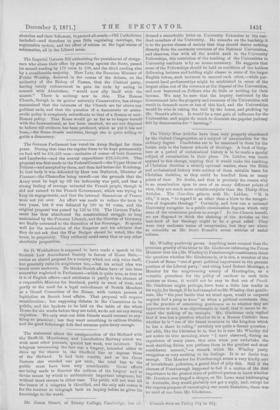The German Parliament has voted its Army Budget for three
years. During that time the regular force to be kept permanently on foot will be 401,659 men—exclusive of course of both Reserves and Landwehr—and the annual expenditure £13,550,000. This proposal was first made to the Federal Council—the Upper House of Princes—and accepted by them, and then laid before the Reichstag. In that body it was defended by Herr von Delbrilek, Minister of Finance—the Chancellor being unwell—on the grounds that the Army must be kept up till the indemnity was paid, and that a strong feeling of revenge actuated the French people, though it did not extend to the French Government, which was trying to keep its engagements, and that the internal dissensions of France were not yet over. An effort was made to reduce the term to two years, but it was defeated by 190 to 84 votes, and the original proposal was passed by 150 to 134. The German Parlia- ment has thus abandoned the constitutional struggle so long maintained by the Prussian Liberals, and the liberties of Germany are finally entrusted to the discretion of her Sovereign. It speaks well for the moderation of the Emperor and his advisers that they do not ask that the War Budget should be voted, like the taxes, in perpetuity. They evidently could carry that or any other absolutist proposition.


































 Previous page
Previous page